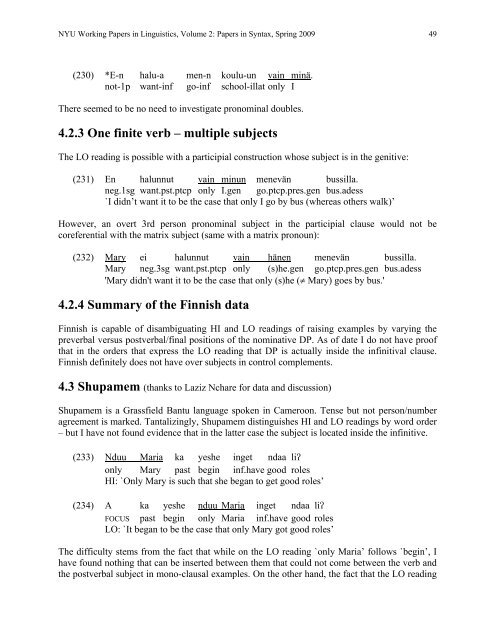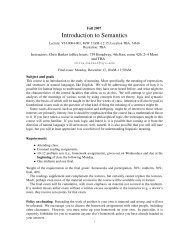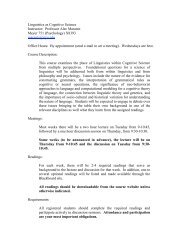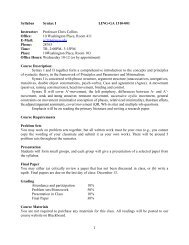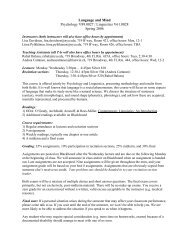Overt Nominative Subjects in Infinitival Complements Cross - NYU ...
Overt Nominative Subjects in Infinitival Complements Cross - NYU ...
Overt Nominative Subjects in Infinitival Complements Cross - NYU ...
Create successful ePaper yourself
Turn your PDF publications into a flip-book with our unique Google optimized e-Paper software.
<strong>NYU</strong> Work<strong>in</strong>g Papers <strong>in</strong> L<strong>in</strong>guistics, Volume 2: Papers <strong>in</strong> Syntax, Spr<strong>in</strong>g 2009 49(230) *E-n halu-a men-n koulu-un va<strong>in</strong> m<strong>in</strong>ä.not-1p want-<strong>in</strong>f go-<strong>in</strong>f school-illat only IThere seemed to be no need to <strong>in</strong>vestigate pronom<strong>in</strong>al doubles.4.2.3 One f<strong>in</strong>ite verb – multiple subjectsThe LO read<strong>in</strong>g is possible with a participial construction whose subject is <strong>in</strong> the genitive:(231) En halunnut va<strong>in</strong> m<strong>in</strong>un menevän bussilla.neg.1sg want.pst.ptcp only I.gen go.ptcp.pres.gen bus.adess`I didn’t want it to be the case that only I go by bus (whereas others walk)’However, an overt 3rd person pronom<strong>in</strong>al subject <strong>in</strong> the participial clause would not becoreferential with the matrix subject (same with a matrix pronoun):(232) Mary ei halunnut va<strong>in</strong> hänen menevän bussilla.Mary neg.3sg want.pst.ptcp only (s)he.gen go.ptcp.pres.gen bus.adess'Mary didn't want it to be the case that only (s)he ( Mary) goes by bus.'4.2.4 Summary of the F<strong>in</strong>nish dataF<strong>in</strong>nish is capable of disambiguat<strong>in</strong>g HI and LO read<strong>in</strong>gs of rais<strong>in</strong>g examples by vary<strong>in</strong>g thepreverbal versus postverbal/f<strong>in</strong>al positions of the nom<strong>in</strong>ative DP. As of date I do not have proofthat <strong>in</strong> the orders that express the LO read<strong>in</strong>g that DP is actually <strong>in</strong>side the <strong>in</strong>f<strong>in</strong>itival clause.F<strong>in</strong>nish def<strong>in</strong>itely does not have over subjects <strong>in</strong> control complements.4.3 Shupamem (thanks to Laziz Nchare for data and discussion)Shupamem is a Grassfield Bantu language spoken <strong>in</strong> Cameroon. Tense but not person/numberagreement is marked. Tantaliz<strong>in</strong>gly, Shupamem dist<strong>in</strong>guishes HI and LO read<strong>in</strong>gs by word order– but I have not found evidence that <strong>in</strong> the latter case the subject is located <strong>in</strong>side the <strong>in</strong>f<strong>in</strong>itive.(233) Nduu Maria ka yeshe <strong>in</strong>get ndaa liʔonly Mary past beg<strong>in</strong> <strong>in</strong>f.have good rolesHI: `Only Mary is such that she began to get good roles’(234) A ka yeshe nduu Maria <strong>in</strong>get ndaa liʔFOCUS past beg<strong>in</strong> only Maria <strong>in</strong>f.have good rolesLO: `It began to be the case that only Mary got good roles’The difficulty stems from the fact that while on the LO read<strong>in</strong>g `only Maria’ follows `beg<strong>in</strong>’, Ihave found noth<strong>in</strong>g that can be <strong>in</strong>serted between them that could not come between the verb andthe postverbal subject <strong>in</strong> mono-clausal examples. On the other hand, the fact that the LO read<strong>in</strong>g


